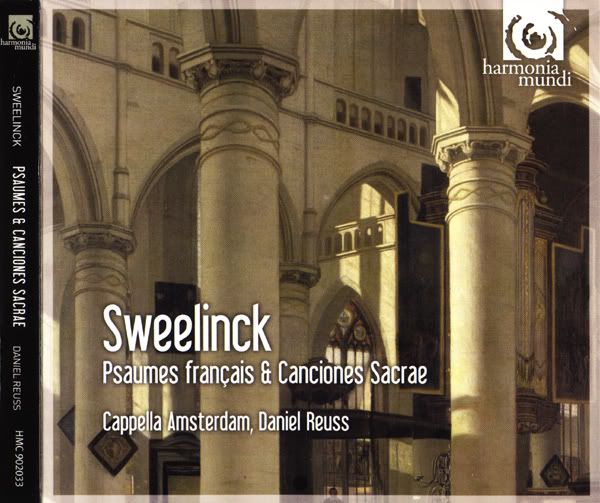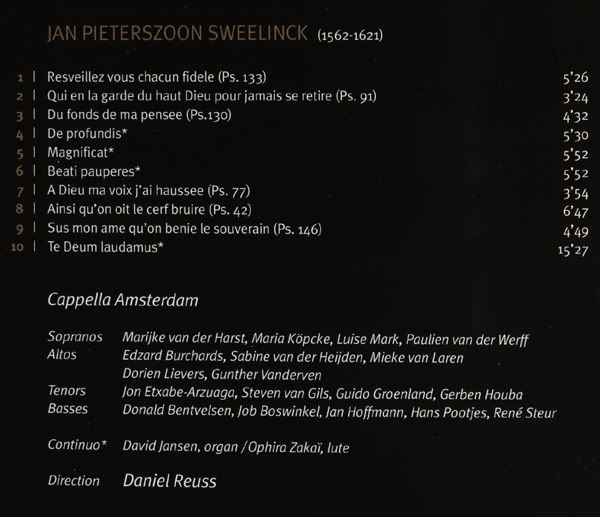 |
| NetLab · Rules · Torrent Tracker · Have a problem? · Eng/Rus |
 Help Help
 Search Search
 Members Members
 Gallery Gallery
 Calendar Calendar
|
| Welcome Guest ( Log In | Register | Validation ) | Resend Validation Email |
|
Posted: 05-10-2012, 21:24
(post 1, #1061968)
|
||||||||||||||||||
|
Pro Member Group: Members Posts: 695 Warn:0% |
Jan Pieterszoon Sweelinck (1562 - 1621) French Psalms and Sacred Chants Label: Harmonia Mundi, HMC 902033 Year: 2009 Performers: David Jansen - organ Ophira Zakai - lute Capella Amsterdam Daniel Reuss - conductor Tracklist: 01. Resveillez vous chacun fidele (Ps. 133) 02. Qui en la garde du haut Dieu pour jamais se retire (Ps. 91) 03. Du fonds de ma pensee (Ps. 130) 04. De profundis clamavi ad te Domine 05. Magnificat anima mea Dominum 06. Beati pauperes spiritu 07. A Dieu ma voix j'ai haussee (Ps. 77) 08. Ainsi qu'on oit le cerf bruire (Ps. 42) 09. Sus mon ame qu'on benie le souverain (Ps. 146) 10. Te Deum laudamus Composer, organist, organ builder and teacher of international renown, Jan Pieterszoon Sweelinck was known in his own time as the "Orpheus of Amsterdam." Among his significant contributions to Franco-Flemish polyphony are psalms in French that closely follow the dictates of the Reformation and sacred vocal works in Latin, among which the Magnificat is particularly outstanding. Cappella Amsterdam is a professional chamber choir that was founded in 1970. Over the past few years the ensemble, under the direction of Daniel Reuss, has occupied a prominent position in the field of early music as well as modern and contemporary repertoires. In Calvinist Amsterdam, music was barely used in worship, so Sweelinck’s duties as organist of the Oude Kerk were to provide concert music and compose pieces for domestic performance. This revealing disc contrasts two styles of vocal ensemble, six settings of Psalms in French and four fine pieces of Latin polyphony. The Psalms were familiar as single-line chants and each is introduced here with a unison verse before breaking into Sweelinck’s polyphonic elaboration. They’re largely syllabic, following the tradition of the French Chanson, and Cappella Amsterdam sing them beautifully, though soft consonants and the spacious acoustic of the Walloon Church in Amsterdam slightly cloud their diction. Sweelinck was sparing with word-painting, though instances such as the chromatically falling ‘tears’ of Psalm 42 are striking. The dark sombre mood of the penitential Psalm 130, ‘Out of the deep’, evokes adventurously shifting harmonies which momentarily test the singers’ intonation (supported, the notes affirm, by continuo though, if present, it remains inaudible). The Latin settings use more expansive lines and descriptions – the Magnificat’s ‘rich are sent empty away’ with a lone cadential voice; the ‘hungry’ of the Beatitudes ‘filled’ with multiple repetitions of one motivic fragment. Expressive, affectionate singing of music which closed the polyphonic age in northern Europe. Jan Pieterszoon Sweelinck, "the Orpheus of Amsterdam," was active at the beginning of the 17th century. Along with the English madrigalists he was one of the last exponents of polyphony in the Renaissance style. He was equally celebrated for instrumental and vocal music in his own time, but now it is his keyboard pieces (which were diffused as far as England) and viol music that get played most often, and this fine sampling of his sacred vocal music will be a welcome addition to Renaissance collections. Among the more famous composers of sacred music in the late Renaissance the one he resembles most is Lassus: his style is restrained, not especially chromatic, yet highly expressive, with a seemingly inevitable connection between music and text, and long lines that seem to unfold over vast stretches of music in substantial pieces like the beautiful 15-minute Te Deum laudamus at the end. His general style was mapped onto diverse Protestant (Calvinist) and Catholic styles in the religiously tolerant city, which especially in the Protestant sphere also allowed a strong secular orientation: Calvinist services permitted no music, and churches like the Oude Kerk, then as now, often served as concert halls. The CD booklet (with commentary and texts in English, German, and French) illustrated this delightfully with a portrait of Sweelinck in a church crowded with all kinds of people and activities. The French pieces (apparently in French, not Dutch, because Sweelinck preferred the French texts) are psalms based on preexisting melodies; the Canciones Sacrae are Latin Catholic motets with a soberness and expressive intensity that ought to recommend them to any choir. These are played with an unobtrusive continuo of lute and organ, a decision that ought to be explained inasmuch as the booklet stresses the slow adoption of this Italian innovation in the Netherlands. The performances by the mixed-gender adult, 18-voice Cappella Amsterdam are otherwise ideal, with flawless intonation that nevertheless gives the expressive dimension of the music room to breathe.  
This post has been edited by kgkk on 05-10-2012, 21:26 |
||||||||||||||||||
|
|||||||||||||||||||


Powered by Invision Power Board v1.3.1 Final.

